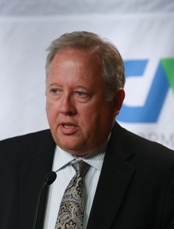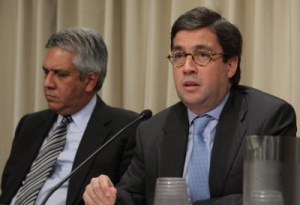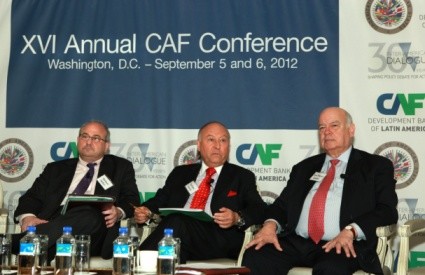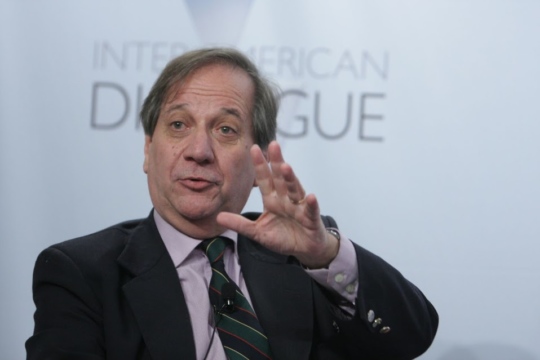
An Americas Agenda for the World
The Inter-American Democratic Charter is a watershed in how the region understands democracy.
Economic growth continues and Latin America is making tremendous gains on several fronts, but the long-term outlook for the region is mixed, Inter-American Dialogue President Peter Hakim told participants at the Corporación Andina de Fomento (CAF) Conference on Trade and Investment in the Americas.
Latin America’s response to the global economic downturn, renewed calls for trade agreements, the impact of rising food and fuel prices and new political developments, led by the U.S. presidential election, were among the issues addressed during the annual conference, which focuses on U.S.-Latin American relations as well as trends and developments affecting the region.
The Sept. 10-11 conference was also sponsored by the Inter-American Dialogue and the Organization of American States (OAS). Participants included CAF president Enrique García, OAS Secretary General José Miguel Insulza, Inter-American Development Bank president Luis Alberto Moreno, several U.S. Congress members, and Latin American policymakers.
Most conference panelists agreed that with strengthened democratic institutions and an economy that has slowed – but is still growing – the region is in a good position for mitigating the effects of the global economic downslide. But challenges remain, including climate change, the reduction of poverty and inequality, regional integration and the need to expand regional infrastructure.
The OAS’s Insulza reminded conference participants of developments that may not be affecting all countries in the region but still are having a dramatic impact on some. He cited crime; inflation, which has reached double-digit percentages in Central America and the Caribbean; and U.S. and European immigration policies.
Trade repeatedly was underscored as a critical tool for pushing Latin American integration forward. During a panel discussion on the region’s economic outlook, Hugo Beteta, secretary of the Inter-American Development Bank, said rising logistics costs, in great part due to high fuel prices, will encourage production closer to its final destination. "Good infrastructure and timely delivery and logistics will be driving forces to increase trade opportunities in the region,” he added.
Three U.S. representatives taking part in the conference said they would push for a vote on pending U.S. trade pacts with Colombia and Panama before Congress adjourns this year. Gregory Meeks, a Democrat from New York; Christopher Cannon, a Republican from Utah; and Jerry Weller, a Republican from Illinois, acknowledged that the movement for free-trade agreements has lost its momentum. But the three expressed optimism about the Colombia and Panama deals.
While Latin America elections sparked lively discussion at past CAF conferences, this time it was the upcoming U.S. presidential election that grabbed the spotlight. Participants agreed that the new U.S. president will have an unprecedented opportunity to forge a new partnership with the region, but there was no clear consensus on how either a Barack Obama or John McCain presidency might work with Latin America’s presidents.
One of the liveliest panels featured advisors to the presidential hopefuls. Dan Restrepo, Obama’s senior policy advisor for the Western Hemisphere, said his candidate would assign a special envoy to Latin America. Adolfo Franco, a McCain advisor for the region, cited his candidate’s close ties – he was born in the Panama Canal Zone and governed a border state – as evidence that he would foster a good relationship with Latin America and the Caribbean.
Conference organizers suggested that the 2009 Summit of the Americas in Trinidad and Tobago, which was discussed extensively, would be the ideal place for the U.S. president to begin building relationships with Latin America’s leaders.
Luis Alberto Rodríguez, coordinator of the summit, explained that exhaustive preliminary work is being done to ensure that the summit not only addresses issues that are relevant but that its goals are attainable.
Energy is among those issues and it was discussed during two sessions of the CAF conference. Latin America’s energy producing countries, led by Venezuela, Brazil and Mexico, are benefiting from high oil prices, although production and productivity in most oil-producing nations has lagged. Brazil was the cited as the exception and state energy company Petrobras was roundly praised.
But not all Latin American countries are energy producers. Net importers, led by Central America and the Caribbean, are struggling against rising energy prices. At the same time, energy – once touted as a driver for regional integration – did not live up to that expectation. Conference participants discussed how energy can be de-politicized and what its long-term implications are for the region.
Regional politics were also discussed, including a panel focused on the Andean countries. Participants noted increased personalization of politics and nationalism throughout the Andes. People’s sense that they are being left out of the national policy-making process is fueling conflict in these countries, even when economic growth has been steady over the past several years. Heraldo Muñoz, Chile’s ambassador to the United Nations, dismissed claims that the region was trending toward left-wing politics. Rather, he said, Latin America has a good mix of political tendencies.
The Inter-American Democratic Charter is a watershed in how the region understands democracy.
The US relationship with Latin America took center stage at the XVI CAF Annual Conference
Summary of the XIV Annual CAF Conference

 Video
Video
